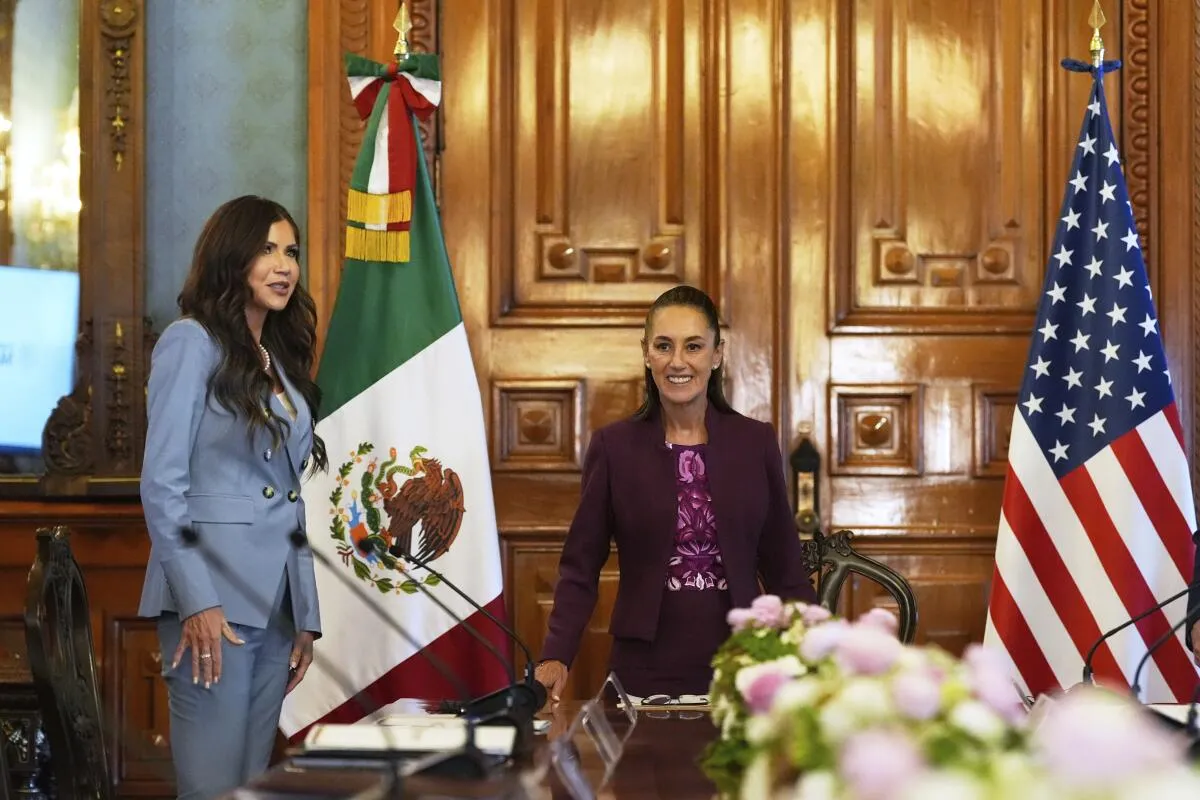Sheinbaum Denies Allegations of Encouraging Violence Amid Political Tensions
In an escalating diplomatic situation that pits Mexican political leaders against U.S. figures, Claudia Sheinbaum, the mayor of Mexico City, has firmly denied allegations put forth by South Dakota Governor Kristi Noem. The allegations surfaced during a contentious period following protests in Los Angeles, where calls for racial justice and against police violence have reignited existing tensions across borders.
The controversy began when Governor Noem accused Sheinbaum of inciting violence during demonstrations that were taking place in Los Angeles, California. As protests unfolded advocating for immigrant rights and social justice, comments made by Sheinbaum were interpreted by some as encouragement for civil disobedience and unrest—claims that Sheinbaum has categorically rejected.
The Political Landscape
Sheinbaum stands as a prominent figure in Mexican politics, currently vying for the presidential candidacy of the National Regeneration Movement (Morena) for the upcoming elections. Her stance on immigration and her proactive response to social issues makes her a target for political discourse, particularly from U.S. conservative figures. Local California protests have gained international attention, further complicating the political landscape.
In response to the unwarranted accusations, Sheinbaum asserted, “I have never encouraged nor do I endorse violence in any form. My role is to advocate for human rights and peaceful dialogue. To falsely attribute such sentiments to me is reckless and counterproductive.” Her comments underline the importance of focusing on peaceful solutions rather than engaging in a blame game that can exacerbate tensions.
Criticism from Trump’s Officials
The situation has also drawn criticism from former President Donald Trump’s inner circle. One aide, who chose to remain anonymous, pointed out that comments coming from figures like Sheinbaum could undermine the administration’s efforts to control border regulations and maintain a stable relationship with Mexico. This concern highlights the complexity of U.S.-Mexico relations, underlined by recent social upheaval.
These comments reflect a broader strategy of some Republicans to portray Democrat-aligned leaders in Mexico and the U.S. as not supportive of law and order, especially amid polarizing protests that often become the centerpiece of political campaigns. This narrative is amplified by strong media framing that scrutinizes right-leaning figures for their responses to leftist counterparts in both countries.
Historical Context of U.S.-Mexico Relations
The rift between the United States and Mexico over issues of immigration and violence is not new. Historically, both countries have navigated a challenging terrain filled with misconceptions and political maneuvering. While the U.S. typically leans towards immigration policies focused on restrictionism, Mexico has advocated for more humane approaches.
Since the administration of President Andrés Manuel López Obrador, Mexico has seen a shift in its foreign policy that positions it more as a staunch advocate for the rights of immigrants and marginalized communities. This policy often creates friction with U.S. leaders who leverage tough slogans to secure political points back home.
Sheinbaum’s Response and Consequences
As Sheinbaum campaigns for national office, her remarks in response to Noem’s allegations suggest a strategic move to maintain her credibility as a leader who seeks peaceful resolutions. Political analysts suggest that such a response will not only bolster her image domestically but could also resonate with listeners in the U.S. concerned about civil rights issues.
Furthermore, Sheinbaum’s focus on dialogue and reform offers a sharp contrast to U.S. political rhetoric that tends to lean toward punitive measures. Whether this approach will influence her chances in the upcoming elections remains to be seen, but it signifies a fundamental ideological split between progressive Mexican politics and conservative U.S. politics.
Future Implications
The repercussions of the allegations made by Governor Noem against Sheinbaum reach beyond mere political intrigue. As both leaders seek to solidify their standings, an underlying competition emerges not just for regional influence but for ideological supremacy. The dynamics of public discourse will play a significant role in shaping public perception in both Mexico and the United States.
Although protests in Los Angeles have incited significant unrest, employing allegations of encouraging violence could serve to galvanize political support among specific voter bases in both countries. It’s an attempt to gain traction off of the fears surrounding instability, often resulting in divisive rhetoric that complicates meaningful dialogue.
Conclusion
As the political landscape grows more fraught with tension, the focus should shift towards solutions that foster collaboration rather than division. Allegations and counter-allegations do little to advance the social causes at the heart of the protests in Los Angeles, nor do they help build bridges between the U.S. and Mexico at a time when both nations face intersecting challenges related to immigration, human rights, and social justice.
Moving forward, it is crucial for leaders on both sides of the border to engage in constructive dialogue. Moreover, for politicians, the ultimate test will be their ability to convey messages that resonate with a tired public yearning for peace, stability, and a commitment to social justice. Addressing the core issues that have led to civil unrest should take precedence over the politics of vilification.







